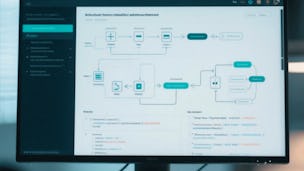Step into the world of enterprise-scale automation with Enterprise Automation and Advanced Use Cases with Ansible — an advanced course designed for IT professionals ready to take their automation expertise to the next level. This course goes beyond foundational skills, equipping you with the tools and strategies to design, manage, and govern automation at scale across complex, hybrid environments. Through real-world enterprise case studies, advanced architectural patterns, and hands-on labs, you’ll gain the expertise needed to lead automation initiatives in large organizations.

Enterprise Automation and Advanced Use Cases with Ansible

Enterprise Automation and Advanced Use Cases with Ansible
This course is part of Ansible Automation: From Fundamentals to Enterprise Specialization

Instructor: Board Infinity
Included with
Recommended experience
What you'll learn
Implement dynamic inventory and advanced variable handling.
Integrate Ansible with CI/CD tools for streamlined automation workflows.
Automate security compliance and audit tasks using Ansible.
Apply Ansible Tower/AAP Controller features for scalable automation governance.
Skills you'll gain
- Devops Tools
- Configuration Management
- Patch Management
- Role-Based Access Control (RBAC)
- Cloud Infrastructure
- Vulnerability Scanning
- DevSecOps
- Infrastructure as Code (IaC)
- CI/CD
- IT Automation
- Automation
- Hardening
- Enterprise Security
- Ansible
- Enterprise Architecture
- Scalability
- Skills section collapsed. Showing 9 of 16 skills.
Details to know

Add to your LinkedIn profile
September 2025
12 assignments
See how employees at top companies are mastering in-demand skills

Build your subject-matter expertise
- Learn new concepts from industry experts
- Gain a foundational understanding of a subject or tool
- Develop job-relevant skills with hands-on projects
- Earn a shareable career certificate

There are 3 modules in this course
This module introduces dynamic inventory concepts and enterprise-level architecture design using Ansible Automation Platform. Learners will explore real-world strategies for integrating cloud providers, managing host groups at scale, and architecting robust inventory systems.
What's included
9 videos4 readings4 assignments1 discussion prompt
This module teaches how to automate security hardening, vulnerability patching, and compliance auditing using Ansible. Learners will apply security content collections and frameworks such as CIS and STIG, and implement automation pipelines for policy enforcement.
What's included
7 videos3 readings4 assignments
This module focuses on integrating Ansible with CI/CD pipelines, implementing governance using Ansible Tower/AAP Controller, and following enterprise automation best practices for versioning, testing, and collaboration.
What's included
7 videos3 readings4 assignments
Earn a career certificate
Add this credential to your LinkedIn profile, resume, or CV. Share it on social media and in your performance review.
Instructor

Offered by
Explore more from Networking

Board Infinity

Board Infinity
Why people choose Coursera for their career

Felipe M.

Jennifer J.

Larry W.

Chaitanya A.

Open new doors with Coursera Plus
Unlimited access to 10,000+ world-class courses, hands-on projects, and job-ready certificate programs - all included in your subscription
Advance your career with an online degree
Earn a degree from world-class universities - 100% online
Join over 3,400 global companies that choose Coursera for Business
Upskill your employees to excel in the digital economy
Frequently asked questions
Ansible is an open-source IT automation tool that simplifies repetitive tasks like configuration management, software provisioning, and application deployment. Learning Ansible helps you save time, reduce errors, and scale IT operations—making it a must-have skill for modern DevOps and system administration.
No. This course is designed for beginners with little to no prior experience. A basic understanding of IT systems or Linux is helpful, but not mandatory. The lessons build from the ground up with practical examples.
The course includes short, easy-to-follow videos, real-life examples, interactive quizzes, and hands-on exercises. Each lesson builds on the previous one, helping you gradually move from core concepts to writing and running simple Ansible playbooks.
More questions
Financial aid available,

